TheRoundup is reader supported. We may earn a small commission when you make a purchase via links on this site, at no cost to you.
All products are personally reviewed and tested in accordance with our Review Methodology.

As pet owners, finding the perfect balance between giving our four-legged friends the best nutrition and doing what's right for the planet can be hard.
With so many brands claiming their product is eco-friendly or sustainable, how do you know which ones actually deliver on their promises?
I've researched and tested (keenly aided by my Labradoodle assistant Millie) to identify the best sustainable dog food available in the US.
Keep reading to discover what makes these brands stand out from other pet foods!

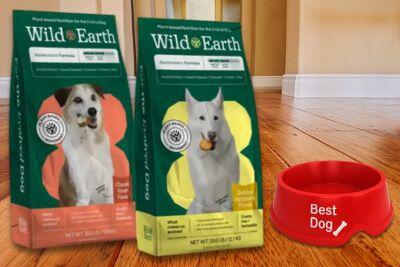
Initially, I had reservations about Wild Earth due to the extensive list of ingredients (with some sounding less than natural). However, upon further investigation, I'm delighted to report that all the ingredients are clean, healthy, and serve a purpose.
This is excellent news indeed...because Millie loves this vegan dog food! The amount of drool on the floor as soon as I reach for this bag is incredible (actually, is that a good thing? 🤔).
Every recipe made by Wild Earth is formulated to ensure complete and balanced nutrition from head to paw. Clean, sustainable, and delicious yeast and plant-derived proteins pack in more protein per weight than most traditional meat-based foods.
Millie tested (and devoured) the Classic Roast flavor, but a Golden Rotisserie flavor is also available. There's also a Performance Formula with extra protein suitable for older or very active dogs.
I also love the simplicity of the Subscribe & Save option. Simply choose the bag size and delivery schedule that suits your needs, and never run out of high-quality dog dinners again!
There's even a Happiness Guarantee. Give it a go for 30 days, and if your furry friend isn't head over paws for the food, Wild Earth will provide you with a full refund, no questions asked!

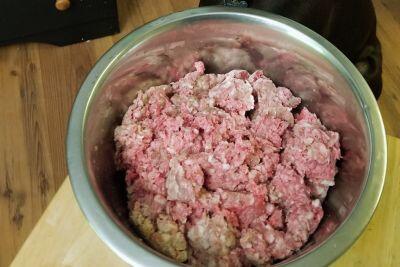
I need to make one thing clear from the start. We Feed Raw is not a cheap option. Millie's test box cost around $50, and the ongoing cost was around $80 weekly. That's for a 62 lb dog eating 100% raw (no mixers).
However, if you believe that a raw diet is best for your dog, then this is the best (and most convenient) option.
I love how the mix of ingredients is tailored to specific needs Fill out a questionnaire, and We Feed Raw generates the perfect recipe to keep your dog in tip-top condition.
I'm also a big fan of the eco-friendly coolers used to keep the food fresh during shipping. Run them under water in your sink, and they'll dissolve within minutes. Cool indeed! 😊

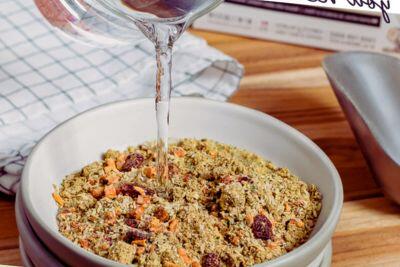
I'd never used dehydrated real food before testing for this article. But now I'm not sure why not, it's a genius idea!
The cage-free turkey used is as ethical as it gets, and I'm impressed by the effort The Honest Kitchen puts into manufacturing all its products in a human food facility (meeting the same high standards we would for ourselves).
This is good, honest, natural food (from an ethical and respected Certified B Corporation). It's just been gently dehydrated to bring you the following benefits:
Preparing a delicious and homemade meal for your beloved pets has never been easier. Add warm water to the dehydrated food, wait three minutes, and voila...a tasty meal that gets two paws up from Millie!

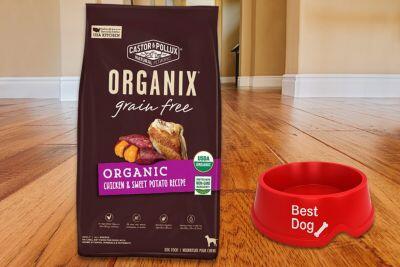
As a leading maker of top-quality organic pet food in the US, Castor & Pollux has pioneered the development of an organic ingredient supply chain that makes purposeful pet food a reality.
Opting for an organic diet for your dog or cat can reduce allergies and itchy skin, improve digestion, and improve overall health.
According to the American Association of Feed Control Officials (AAFCO), natural products are derived from unprocessed or minimally processed plant, animal, or mined sources without synthetic chemicals. On the other hand, organic signifies a higher standard that goes beyond simply being natural.
Millie tested (and loved) the chicken and sweet potato dry food, but many options are available. In fact, ORGANIX proudly offers the only complete line of USDA Organic-certified pet food (so you're sure to find something your dog will love).
Every ORGANIX recipe is made with a minimum of 95% certified organic ingredients and cooked with love in an organically certified kitchen in the US. Amazing!

✔ Microwave Safe Pouch
✔ Good For Picky Eaters
✔ Just 11 Ingredients
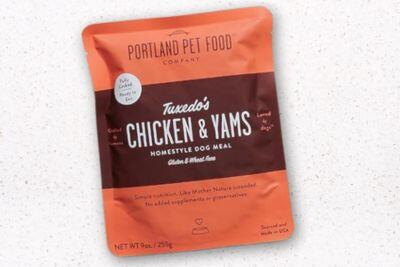
Portland Pet Food Company's tasty and healthy meal pouches are crafted with fresh, human-grade ingredients sourced locally in the Pacific Northwest. With no preservatives, hormones, meat by-products, or artificial additives, these pouches are a step above average doggy dinners.
They offer a natural and healthy boost packed with flavor and nutrition that dogs love. And with five varieties, you can easily rotate meals or use them as delicious toppers.
I'm impressed by Portland Pet Food Company's commitment to environmental responsibility. The vacuum-sealed, BPA-free pouches significantly reduce waste and shipping costs compared to canned wet food.
The pouches are microwave-safe if your picky pooch will only eat hot food. Just be sure not to overheat and risk scolding your dog's mouth.
These pouches are an excellent choice if you travel with your dog a lot (especially camping) as they take up less space (and weigh less) than wet food in cans.
I pop a pouch in my pocket when going out on full-day hikes with Millie and the family so we can all enjoy a bit of wild dining.
Sustainable dog food options are all about the eco-friendly production and consumption of our puppies' chow.
This means the ingredients aren't just good for our dogs but also sourced responsibly, with minimal environmental harm and maximum respect for animal welfare.
It's like giving your dog a taste of Mother Nature's best without leaving any bite marks on the planet.
Feeding your dog sustainable food can have a significant positive impact on our planet.
One of the critical environmental concerns is the sourcing of ingredients.
Unsustainable farming practices (such as clear-cutting forests for animal feed) contribute to deforestation and habitat loss. By opting for sustainable food, you can support brands prioritizing responsible sourcing, reducing your contribution to deforestation.
In addition to sourcing, the production and packaging of the food also have a significant environmental impact.
Many conventional dog and cat food brands use non-recyclable packaging materials, which end up in landfills and contribute to pollution.
On the other hand, sustainable brands focus on using recyclable or biodegradable packaging materials, reducing waste, and promoting a circular economy.
Many sustainable brands also use locally sourced ingredients whenever possible, reducing the environmental impact of transportation emissions.
Eco-friendly dog owners are becoming increasingly aware of the ingredients used in pet foods.
As such, sustainable brands use natural and organic ingredients to ensure your pup receives optimal nutrition.
Also, feeding your dog sustainable organic food might help reduce their risk of developing health conditions (especially skin conditions and allergies caused by cheap grains and fillers).
High-quality organic and natural food tends to be free of artificial additives and packed with natural, nutrient-rich ingredients that will keep your pup wagging its tail.
While sustainable brands offer solutions to many environmental concerns in the pet food industry, there are still some challenges to be aware of.
One such challenge is the availability and accessibility of sustainable pet food. Finding some sustainable options may be difficult, especially if you're looking for specific dietary requirements.
Additionally, sustainable food costs may be higher than conventional brands. This can be a barrier if you're on a tight budget.
When it comes to your pup's plate, the saying "you are what you eat" couldn't be more accurate.
Look out for natural, whole-food ingredients. Prioritize real meat, veggies, and grains. Avoid anything that sounds like it was cooked up in a chemistry lab. If you can't pronounce it, your dog probably shouldn't be eating it.
Supporting ethical companies isn't just good karma...it makes good sense!
Companies that care about our four-legged friends will more than likely also care about our two-legged ones and the planet we all share.
Look for brands prioritizing animal welfare, fair trade, charitable ventures, and sustainable farming practices.
Green labels and certifications can be a handy shortcut when navigating the dog dinner aisle.
They help you avoid greenwashing and give you peace of mind that you're buying products that meet stringent standards.
Some of the best to look out for include:
Just like humans, every dog is unique. Some may have specific dietary needs due to allergies, age, or health conditions.
You wouldn't feed a Chihuahua the same thing as a Great Dane, would you? So, make sure you're considering your dog's individual needs when choosing their chow.
When it comes to convenience and affordability, dry dog food takes the biscuit (sorry). It's the equivalent of our pantry staples (long-lasting, easy to store, and perfect for busy pet parents). Plus, that crunchy texture? Great for your pup's dental health.
But it's not all sunshine and chew toys. Some dry foods are packed with fillers and low-quality ingredients.
Always check the label. Look for products with whole foods, lean proteins, and minimal additives. Your furry friend will thank you!
Next up is wet food. It's moisture-rich and often more palatable to our picky eaters. It's also easier to chew (a bonus for senior dogs or those with dental issues).
However, wet food spoils faster and can be pricier than dry food.
Also, some reports suggest that wet food has a higher environmental cost than dry food.
Raw dog food is the new kid on the block, causing quite a stir in the pet world.
Advocates bark about benefits such as shinier coats, healthier skin, and improved digestion.
However, raw food requires careful handling to prevent bacteria from spreading. It's also unsuitable for some dogs, especially those with compromised immune systems. When in doubt, consult your vet.
This type of food meets the same quality and safety standards as the food on our plates.
It has a price tag to match, but if you're an eco-friendly pet parent with some dollars to spare, human-grade organic dog food could be an excellent option for your pampered pooch.
However, before feeding your dog the very best, it's worth noting that the World Wildlife Fund reports that human-grade food is often unnecessary for dogs and places an extra burden on the global food system.
I'm not saying human-grade food is a bad option for your pup. But you do need to carefully balance the well-being of your good boy or girl with food availability for future generations.
You might be considering hitting the kitchen for the ultimate control over what goes into your dog's food options.
Doing so can save you money and be better for your dog. However, ensure that you include the right balance of nutrients for your dog.
As a general rule of thumb, you should aim for a DIY recipe that's one-third protein, one-third raw veggies, and one-third root veggies (such as sweet potato and pumpkin).
Dr Jones from Veterinary Secrets has some good advice to help you start your DIY dog dinner journey.
Numerous factors were taken into consideration by me and Millie when testing a wide range of dinner options for this article, such as:
Switching what your dog eats can be a bit tricky. It's essential to take it slowly, introducing the new food gradually over 7-10 days.
Start by mixing 25% of the new food with 75% of the old food for a few days, then 50:50, and finally 75% new and 25% old.
During this transition period, you should monitor your pet closely for signs of stomach upsets or other health issues.
It's also important to remain mindful of your pet's nutritional needs. Ensure any new food you choose is appropriate for their age, size, and health conditions.
As an eco-conscious pup parent, you want to spoil your four-legged friend without ruining the planet.
The products in the following articles help you do just that:
The best way to reduce your dog's carbon pawprint is to switch to eco-friendly and sustainable products for all their needs. Also, consider reducing your dog's meat consumption by incorporating more high-quality plant-based protein sources into their diet.
This is not a brand I tested, but according to the Purina website, "Beneful is made and produced in U.S.A. facilities."
Yes, some meat-based foods are sustainable. Look for brands that use humanely raised, grass-fed, antibiotic-free meats from small family farms. These brands should also be committed to sustainability practices such as reducing waste and sourcing locally whenever possible. Be sure to read labels carefully when selecting a food.
Yes, you can freeze fresh pet food. When freezing, store the food in an air-tight container or vacuum-sealed bag and place it in the coldest part of your freezer. The food should stay safe for up to three months. However, if you notice any changes in smell or texture when thawing the food, it's best to discard it and not feed it to your pet.
Yes, dogs can live solely on vegetarian pet food. Dogs are omnivores, so they can get the necessary nutrients from various sources, including plants and grains. However, you should consult with your veterinarian to determine the best diet for your pet's health needs, as this is a very polarizing topic. For example, PetMD says yes, and the British Veterinary Association says no.
From an environmental standpoint, chicken (and fish) have less impact than cows. So, ethically produced chicken or sustainably caught fish is better than beef.
BARF stands for Biologically Appropriate Raw Food (also referred to as a raw-food diet). This form of nutrition consists of uncooked meats, offal, fruits and vegetables, eggs, nuts, and seeds.
Meat meal (a processed and dried form of meat commonly found in low-cost kibble) often contains lower-quality cuts, bones, hooves, and other animal parts. It's significantly less nutritious compared to fresher, higher-quality meats and fish.
The Four Ds of meat are Dead, Dying, Diseased, and Disabled livestock. This type of meat should be avoided due to the potential risk of contamination with harmful bacteria or viruses. Additionally, there is a good chance that the animals were not treated humanely before being slaughtered, which is ethically wrong.
Open Farm is not a brand I tested for this article. However, I like the look of its Freeze Dried Raw options, and I'll definitely be testing them when the time comes to update this article.
When you consider that the pet food industry is responsible for 25% of the environmental impact of global meat production, it's not hard to see why feeding your dog sustainably is a decision that benefits both your pet and the environment.
By choosing sustainable brands, you can help reduce deforestation, pollution, and the industry's overall carbon footprint.
The sustainable and eco-friendly brands mentioned in this article offer a range of options to suit different dietary needs, preferences, lifestyles, and budgets.
Explore the options, read the reviews, and choose a brand that aligns with your values and supports a greener, more sustainable future for your furry friends.
Sustainable protein? Sustainable packaging? Sustainable practices? Recyclable packaging? What do you look for when feeding your dog? Have I missed your favorite eco-friendly brand? Let me know.

Our core values mean we always prioritize sustainability over profit. We carefully evaluate and personally test every product to ensure they meet our high standards. All products recommended in this article were tested in accordance with our Review Methodology.
TheRoundup.org - As Seen On
